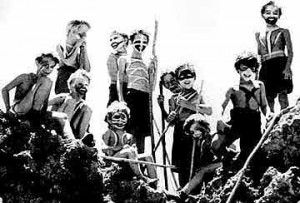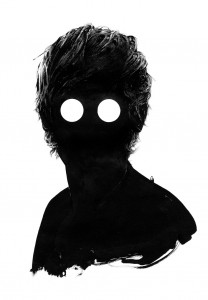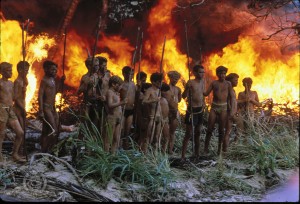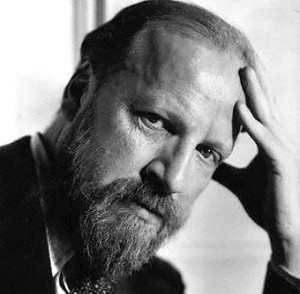
“Like any orthodox moralist Golding insists that Man is
a fallen creature, but he refuses to hypostatize Evil or
to locate it in a dimension of its own.
On the contrary Beelzebub, Lord of the Flies,
is Roger and Jack and you and I,
ready to declare himself as soon as we permit him to.”
—from “The Fables of William Golding” by John Peter, 1957
 “Lord of the Flies is a very serious book which has to be introduced seriously. The danger of such an introduction is that it may suggest that the book is stodgy. It is not. It is written with taste and liveliness, the talk is natural, the descriptions of scenery enchanting. It is certainly not a comforting book. But it may help a few grownups to be less complacent and more compassionate, to support Ralph, to respect Piggy, control Jack, and lighten a little the darkness of man’s heart. At the present moment (if I may speak personally), it is respect for Piggythat seems needed most. I do not find it in our leaders.”
“Lord of the Flies is a very serious book which has to be introduced seriously. The danger of such an introduction is that it may suggest that the book is stodgy. It is not. It is written with taste and liveliness, the talk is natural, the descriptions of scenery enchanting. It is certainly not a comforting book. But it may help a few grownups to be less complacent and more compassionate, to support Ralph, to respect Piggy, control Jack, and lighten a little the darkness of man’s heart. At the present moment (if I may speak personally), it is respect for Piggythat seems needed most. I do not find it in our leaders.”
—E. M. Forster, introduction to Howard-McCann edition of
Lord of the Flies, 1962
 “The South-Sea island setting suggests everyone’s fantasy of lotus-eating escape or refuge from troubles and care. But for Golding this is the sheerest fantasy: there is no escape from the agony of being human, no possibility of erecting utopian political systems where all will go well. Man’s inescapable depravity makes sure “it’s no-go” on Golding’s island just as it does on the various islands visited by Gulliver in Swift’s excoriating examination of the realities of the human condition.”
“The South-Sea island setting suggests everyone’s fantasy of lotus-eating escape or refuge from troubles and care. But for Golding this is the sheerest fantasy: there is no escape from the agony of being human, no possibility of erecting utopian political systems where all will go well. Man’s inescapable depravity makes sure “it’s no-go” on Golding’s island just as it does on the various islands visited by Gulliver in Swift’s excoriating examination of the realities of the human condition.”
—from The Novels of William Golding by S. J. Boyd, 1988
Golding himself had this to say about Lord of the Flies in his essay collection A Moving Target (1985):
More than a quarter of a century ago I sat on one side of the fireplace and my wife on the other. We had just put the children to bed after reading to the elder some adventure story or another—Coral Island, Treasure Island, Pirate Island, Magic Island. God knows what island. Islands have always and for good reason bulked large in the British consciousness. But I was tired of these islands with their paper-cutout goodies and baddies and everything for the best in the best of all possible worlds. I said to my wife, “Wouldn’t it be a good idea if I wrote a story about boys on an island and let them behave the way they really would?” She replied at once, “That’s a first class idea. You write it.” So I sat down and wrote it.
 A story about boys, about people who behave as they really would! What sheer hubris! What an assumption of the divine right of authors! How people really behave—whole chapters in that row of books behind my chair do little in the last analysis but agree to or dissent from that first casual remark. How then did I choose a theme? Even then, did I know what I was about? It had taken me more than half a lifetime, two world wars and many years among children before I could make that casual remark because to me the job was so plainly possible.
A story about boys, about people who behave as they really would! What sheer hubris! What an assumption of the divine right of authors! How people really behave—whole chapters in that row of books behind my chair do little in the last analysis but agree to or dissent from that first casual remark. How then did I choose a theme? Even then, did I know what I was about? It had taken me more than half a lifetime, two world wars and many years among children before I could make that casual remark because to me the job was so plainly possible.
Yet there is something more. In a way the book was to be and did become a distillation from that life. Before the Second World War my generation did on the whole have a liberal and naïve belief in the perfectibility of man. In the war we became if not physically hardened at least morally and inevitably coarsened. After it we saw, little by little, what man could do to man, what the Animal could to do his own species. The years of my life that went into the book were not years of thinking but years of feeling, years of wordless brooding that brought me not so much to an opinion as a stance. It was like lamenting the lost childhood of the world. The theme defeats structuralism for it is an emotion.
The theme of Lord of the Flies is
grief, sheer grief, grief, grief, grief.

Lord of the Flies Analysis
“Like any orthodox moralist Golding insists that Man is
a fallen creature, but he refuses to hypostatize Evil or
to locate it in a dimension of its own.
On the contrary Beelzebub, Lord of the Flies,
is Roger and Jack and you and I,
ready to declare himself as soon as we permit him to.”
—from “The Fables of William Golding” by John Peter, 1957
—E. M. Forster, introduction to Howard-McCann edition of
Lord of the Flies, 1962
—from The Novels of William Golding by S. J. Boyd, 1988
Golding himself had this to say about Lord of the Flies in his essay collection A Moving Target (1985):
More than a quarter of a century ago I sat on one side of the fireplace and my wife on the other. We had just put the children to bed after reading to the elder some adventure story or another—Coral Island, Treasure Island, Pirate Island, Magic Island. God knows what island. Islands have always and for good reason bulked large in the British consciousness. But I was tired of these islands with their paper-cutout goodies and baddies and everything for the best in the best of all possible worlds. I said to my wife, “Wouldn’t it be a good idea if I wrote a story about boys on an island and let them behave the way they really would?” She replied at once, “That’s a first class idea. You write it.” So I sat down and wrote it.
Yet there is something more. In a way the book was to be and did become a distillation from that life. Before the Second World War my generation did on the whole have a liberal and naïve belief in the perfectibility of man. In the war we became if not physically hardened at least morally and inevitably coarsened. After it we saw, little by little, what man could do to man, what the Animal could to do his own species. The years of my life that went into the book were not years of thinking but years of feeling, years of wordless brooding that brought me not so much to an opinion as a stance. It was like lamenting the lost childhood of the world. The theme defeats structuralism for it is an emotion.
The theme of Lord of the Flies is
grief, sheer grief, grief, grief, grief.
Comments Off on Lord of the Flies Analysis
Filed under AP Literature
Tagged as analysis, AP, books, commentary, LOTF